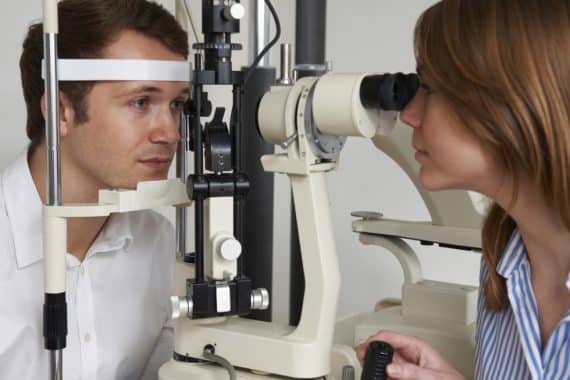Eye Specialist for Glaucoma Fort Myers
Many patients experience slow vision changes, particularly with aging. If you notice a loss of side or peripheral vision, this may be a sign that you have glaucoma. Whether or not you suspect glaucoma, if it has been a while since you’ve had an eye exam, come see our eye specialist for glaucoma in Fort Myers at Elmquist Eye Group. Glaucoma usually has no symptoms, so these eye exams are the only way to detect the disease.
What causes glaucoma?
 Glaucoma usually happens so slowly that most people don’t even notice changes in vision. However, as the disease gets worse, people usually notice a change in peripheral vision.
Glaucoma usually happens so slowly that most people don’t even notice changes in vision. However, as the disease gets worse, people usually notice a change in peripheral vision.
What causes glaucoma to start in the first place? While scientists are not exactly sure what causes glaucoma, most people with the disease have a high internal eye pressure, known as intraocular pressure. There are several types of glaucoma, but the most common form is called open-angle glaucoma. Over time, the high pressure damages the optic nerve and leads to vision loss and eventual blindness if the condition is not treated.
Research definitely shows that higher eye pressure does increase a person’s risk for optic nerve damage. When fluid can’t normally drain out of the front of your eye, the pressure inside the eye builds up. However, some patients still develop certain forms of glaucoma even without a higher eye pressure.
The overwhelming majority of glaucoma cases each year are open-angle glaucoma cases, accounting for about 2.7 million of the 3 million US cases. The fluid in the eye passes too slowly to drain, and pressure buildup occurs inside the eye. When that pressure gets too high, optic nerve tissue is damaged.
Who is at risk? Should I seek medical help?
While anyone, particularly people over age 40, can get glaucoma, people with a family history are at a higher risk. People over age 60 are at higher risk, and African Americans and Hispanic peoples are at higher risk once they reach age 40. Know your family history, and talk you’re your doctor about your risk profile.
When the pressure inside the eye becomes too high, optic nerve damage occurs. The problem is that people don’t know they have elevated eye pressure. Glaucoma is preventable but it has no symptoms, so it is a difficult disease to deal with. The only way you can monitor your eye health is to have regular annual eye exams.
Lowering the internal pressure inside the eye can help stop any further vision loss from glaucoma, so our treatments are aimed at controlling the high pressure inside the eye.
One form of glaucoma is called angle-closure glaucoma and it has a sudden onset of symptoms including a red eye, intense eye pain, blurred vision and nausea. If you suddenly experience these symptoms, get to an emergency room immediately.
The Elmquist experts
Glaucoma can happen in one or both eyes, and it is important to remember that there is no way to prevent glaucoma, so early detection through an eye exam is important. We can stop further vision loss. A comprehensive eye exam is the key, so give us a call today and make an appointment with the experienced Fort Myers eye specialists for glaucoma at Elmquist Eye Group.
